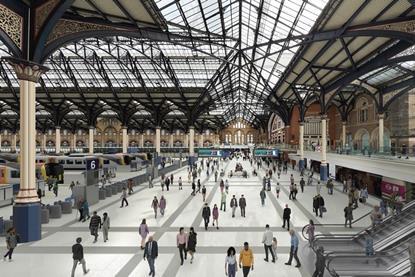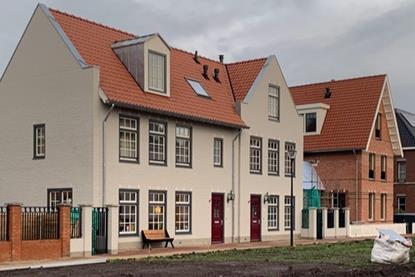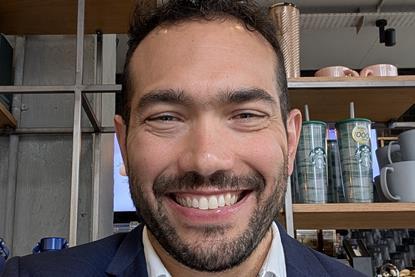- Home
- Intelligence for Architects
- Subscribe
- Jobs
- Events

Events calendar Explore now 
Keep up to date
Find out more
- Programmes
- CPD
- More from navigation items
Opinion
Latest Opinion
Where, then, do we really wish to live?
Hundreds of studies into what people like and why have produced clear and consistent results. So it is beholden on us to build places that give residents what they want and need, writes Nicholas Boys Smith
Advertisement
Advertisement
More Opinion
Network Rail should pay heed to John McAslan’s light-touch Liverpool Street station redevelopment plan
It has been arguably the most chaotic development process of any major project in the UK over the past decade but the latest proposals could well be the best way forward for Network Rail
Rethinking sustainability by designing for social resilience
We must move beyond focusing solely on material sustainability and incorporate social resilience into our approach to conservation and to every design brief for new buildings and masterplans, writes Regine Kandan
Protecting small builders can solve the UK’s housing crisis
The backbone of postwar Britain’s vast housebuilding drive, small builders now face extinction as regulatory barriers and policy layering make it ever harder for them to compete, build and survive. Hugo Owen has some solutions
What’s in a name… Do the public really understand what it means to be an ‘architect’?
The current debate about protection of title is much more than a fight between the RIBA and the ARB. We need to learn from the mistakes of the past, says Eleanor Jolliffe
WA100 2026: The best get better
Despite volatile times, architects are the most optimistic they’ve been about prospects for the year ahead since the post-covid bounce of 2022. Although optimism on growth dropped sharply back in 2023, this has steadily increased each year to almost match that of 2019. This is reflected in the number of ...
If 2025 was the year of architecture’s AI awakening, 2026 must be the year when we map out the way ahead
As architecture grapples with the transformative potential and undoubted tensions of artificial intelligence, Oriana Fernandez considers how AI has become the industry’s next big thing and examines how three leading practices are following different paths down AI’s “rabbit hole”
Like it or not, the baronial style still captures the essence of Scotland
It may have become unfashionable and left the modern architectural community unimpressed, but the wider public certainly appreciates the turrets and gables made famous by Sir Walter Scott. Just look at The Traitors, Rab Bennetts writes
Why we need to rediscover council housing
A significant increase in the number of social and affordable homes is required if we are to get close to hitting the government’s targets, David Rudlin writes
How popular, traditional architecture arrived in the Netherlands
For years Dutch housing architects were able to ignore the tastes and preferences of their tenants and pursue unashamedly modernist projects. But, as home ownership increased, the demand for more traditional yet affordable houses grew with it
How popular, traditional architecture arrived in the Netherlands
For years Dutch housing architects were able to ignore the tastes and preferences of their tenants and pursue unashamedly modernist projects. But, as home ownership increased, the demand for more traditional yet affordable houses grew with it
Air quality in green building certification: what you need to know
Julie Tait explains how indoor air-quality standards in sustainable building certification are changing – and offers her golden rules for ensuring compliance
Brand activation – how design can combine the interests of brands and venue owners
Populous has been combining design and brand storytelling in stadiums, arenas and venues for more than 20 years. Simon Borg explains the process
Our choices in 2026 will decide whether architecture remains a public service
The past president of the RIBA calls for bold thinking and institutional change in order that we can build better
We must encourage the building of urban one-home wonders
The National Planning Policy Framework includes a specific allowance for single houses in rural areas that are “truly outstanding” where they would otherwise be refused. An equivalent provision is needed in urban areas, writes Russell Curtis
The future of high-rise: why restoring public trust means redefining value
Dr Danilo Gomes argues the future of high-rise housing depends as much on building in social value as it does on overcoming regulatory bottlenecks
Why I have decided I will no longer be called an architect
We need a new system of registration which focuses on the competence of all built environment professionals if we are to ensure buildings are safe and of high quality, Chris Williamson explains
The government’s ‘build, baby, build’ agenda cannot succeed unless architects are involved from the start
Only around 6% of UK homes are designed by architects, but getting them involved early is one of the most effective ways of ensuring that homes are built to last, to support community life, and are easier to live in over time, says Simon Vernon-Harcourt at City & Country
Signs of progress and goodwill at this latest Grenfell landmark
This Sunday marks another significant date for the community of bereaved relatives and concerned residents in Kensington and Chelsea, but this year it takes place amid changed circumstances, writes Emma Dent Coad
Designing cities for play: Why child-friendly spaces matter
Children are the benchmark of an area’s liveability. They tell us whether it is healthy and inclusive. If it does not work for them, it is failing, writes Lendlease’s Nick Watson
How architects can unlock ‘difficult’ sites across the UK
Constrained and underused land can be transformed into a catalyst for sustainable, connected urban growth with some pragmatic, design-led thinking, writes Louise Scannell, a design director at WW+P
What’s stopping us from reducing the cost of sustainable design?
Anna Beckett argues that while steel reuse and ambitious retrofit strategies remain more costly than conventional construction, the industry can no longer rely on goodwill alone and only clear regulation on embodied carbon will create the level playing field needed to make reuse mainstream
Engineering the future: What biodiversity means for the next generation of design
The BNG requirement was meant to be a positive not a problem for developments. Design teams must take the lead to make sure it works as intended, Agata Lo Certo writes
Why I believe the ARB’s reforms are dumbing down architecture
As the ARB moves to overhaul the structure of architectural training, Austin Williams warns that the proposed changes will weaken standards and erode architects’ professional standing
Public-sector procurement in Scotland is a mess – and architects are paying the price
Given the high proportion of public sector projects and the number of small practices operating on tight margins, attempts by the RIAS to improve an unsustainable situation are most welcome, Rab Bennetts writes
Why AI won’t replace architects – it will make them better
Dr Stephen Hamil argues that AI’s true value lies in liberating architects from administrative tasks, allowing them to focus on creative problem-solving while machines handle technical groundwork and compliance checking
AI could force us to re-imagine how public consultation in planning works
Local residents are increasingly using AI tools to craft letters of objection to schemes en masse. We need to think about how technology could help us to create a better planning system, writes Paul Smith
The paradox of simplicity – achieving invisible luxury in super-prime homes
Cameron de Wys explains why today’s most luxurious homes are defined as much by what we don’t see as what we do, and describes the challenges involved…
Why I’m still grateful to be practising architecture in New York
Chris Fogarty looks back at the culture, character and creative possibilities of New York, and why they still inspire him after 30 years in the city
Who is really advocating for architects?
Drawing on the Fawcett Society’s findings, Eleanor Jolliffe asks whether the profession’s culture and its lack of meaningful representation is failing not only women but architects more widely
How rising software prices are shutting out SME architects
Soaring subscription costs are becoming a structural threat to SME architects, with essential tools rising far beyond inflation and no viable alternatives in sight, Hien Nguyen writes
The built environment: Britain’s hidden super industry
Martyn Evans argues that one of Britain’s largest and most vital industries remains hidden in plain sight. He urges the government and business to recognise the built environment as a unified sector central to national prosperity
Expectant on site: reflections on pregnancy and architectural practice
Architect Jennifer Pirie explores how being pregnant and on site revealed opportunities for a more inclusive architectural culture
Two decades on and women in architecture still face many of the same barriers
In response to the Fawcett Socety’s independent report for the RIBA, Sumita Singha asks why so many women in architecture still struggle to be valued and recognised throughout their careers








































